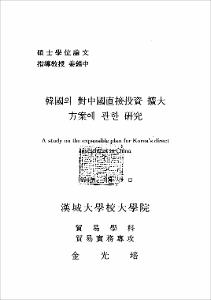韓國의 對中國直接投資 擴大 方案에 관한 硏究
- Files in This Item:
-
-
Download
 000000066460.pdf
기타 데이터 / 3.12 MB / Adobe PDF
000000066460.pdf
기타 데이터 / 3.12 MB / Adobe PDF
-
Items in Repository are protected by copyright, with all rights reserved, unless otherwise indicated.
 000000066460.pdf
기타 데이터 / 3.12 MB / Adobe PDF
000000066460.pdf
기타 데이터 / 3.12 MB / Adobe PDFItems in Repository are protected by copyright, with all rights reserved, unless otherwise indicated.